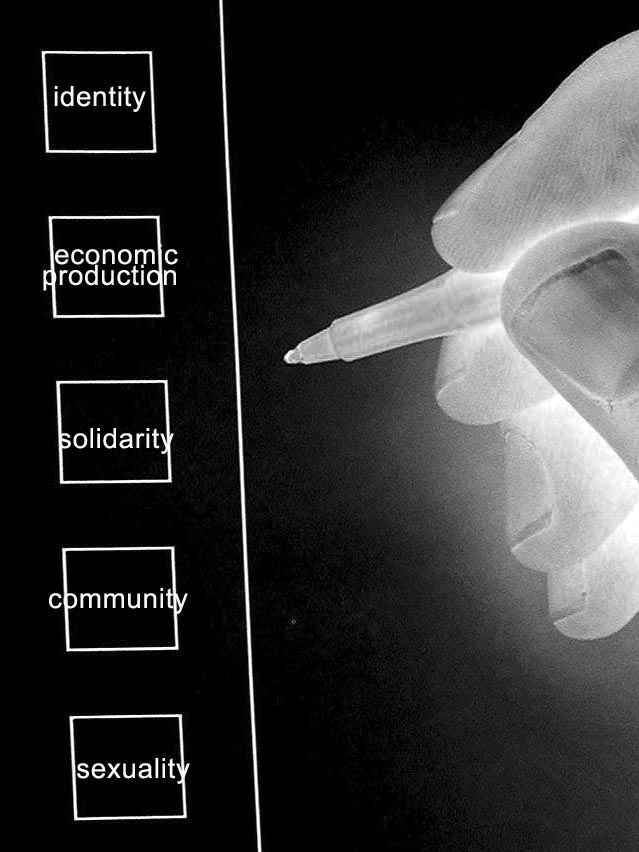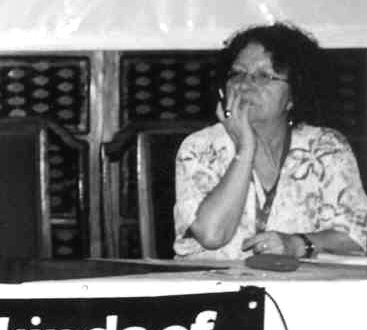
Democracy: Ruptures and Transformations
In a panel titled “Transforming Democracies” (Transformando las democracias) during the 3rd Feminist Dialogues last January 2007 in Nairobi, Virginia Vargas defined the feminist political position while reflecting on the different forms of democracy.
We have three basic thrusts that we are going to develop. First is to recover the complexities of democracy, not only as a system of government but as a system of social organisation at various levels—in the material level as much as in the symbolic, public as much as in the private, global as much as in the local.
Second,to develop a criticism of actually existing democracies in relation to the ways democratic nationalities are constructed or restrained, and the forms in which various types of political regimes (neo-liberal, militarist and fundamentalist) are nourished, in the state level as well as in the global level.
And finally, to regain the processes of radicalisation of democratic notions of freedom, equality, self-determination and autonomy, and how this radicalisation can be expressed in terms of redistribution of wealth and common goods. In other words, to try to discern these notions of democracy that will move forward proposals of justice at the economic and the cultural levels, at the symbolic and the political levels.
The first thing that I want to put in place is where we are coming from as feminists. We all know that there are many feminisms. I speak from a specific position that considers feminism in its theoretical dimension as well as in its political practice. It is a kind of feminism that develops a critical thinking about current realities and a questioning praxis of sexual and social compromises that exist. It involves analysing and acting on the discrimination of women in permanent confrontation and dispute against other forms of social domination and discrimination. That is to say, we are fighting not only for women but in conjunction with other significant formations that we need to truly transform our society, and truly make another world possible.
At this level, this feminist position has developed substantial ruptures and transgressions that have helped in the reinvention of ways of thinking and acting about the tensions between the sexes or relationships in society. The feminist proposition in which we find ourselves nurtures a new way of looking at the world and a new political culture. It generates new forms of interpretation, new frameworks of making sense of reality. It tries to articulate strategies of social movements, creating projects oriented towards overcoming all forms of exploitation, discrimination and domination. Above all, it tries to confront three predominant forces that exclude, violate and hold humanity in subjection: the forces of neo-liberalism, militarism and fundamentalism.
What we face is dramatically different from what we lived in a few decades ago including the last century, because we are not just facing a time of intense change, we are facing a change of times. A change of times, as it should be, is like the discovery of the wheel or the industrial revolution during its time. It is a change that involves change from industrial capitalism to globalised capitalism, hyper-concentrated but at the same time non-territorialised; changes that are, so to speak, no longer for states alone, but for the entire planet. These changes are developing at a planetary level because of new technologies, but they are also slowly producing multiple resistances against hegemonic forces.
We are in an unjust society, a society at risk because of an economic model that favors the market over people and the economy over politics. We face challenges from conservative societies and fundamentalists, but at the same time live a lifestyle of speed and intensity greater than before, with new social practices that hint at paradigms that are at this moment already in construction and that nurture new reflections.
There is a permanent ambivalence in this process because everything that we had known are many times not useful anymore, and everything that we need, we have just started to construct. For example, when we talk about a society at risk, we can look at it with all its contradiction, for example, a different conscience from what we used to have. A conscience about a planet at risk and about the scarcity of water in the near future, a conscience about the ozone layer and about the injustice in the redistribution of wealth, which feeds at the same time a confluence of actors—social and political—organised around each one of these dimensions.
But at the same time that it produces these social movements, it transforms traditional customs, conservative notions and “common sense”. For example, the changes that have brought about globalisation also opens the door for the necessity of certainties, the necessity of knowing in what world we are in and what we can do within it. This spurs us to see in ways we did not see before—in relation to the suffering of people from the fundamentalisms that are attacking women with tremendous force, fundamentalisms that are not just religious or financial, but are also cultural.
Precisely because new social practices and new subjectivities develop that coexist with anti-democratic practices and grassroots subjectivities, we can admit that we are facing a historical tension between the forces of regulation and the forces of emancipation.
Although this process has left the division of labour of the sexes untouched as a form of organisation of society, it is evident that the continuing impoverishment of women is totally a function of neo-liberal capitalism. The dominant neo-liberal policies lead to an increase in women’s workload, to women assuming duties which the states do not carry out because of privatisation processes. At the same time that neo-liberal capitalism has produced changes that seem irreversible—people have become much more willing to accept new ideas—notions of autonomy, of freedom, of equality—and they start to change their perceptions of these things as people subject to laws.
Precisely because new social practices and new subjectivities develop that coexist with anti-democratic practices and grassroots subjectivities, we can admit that we are facing a historical tension between the forces of regulation and the forces of emancipation. This tension is expressed at the present moment as a tension between a hegemonic, neo-liberal, exclusive, anti-democratic globalisation and an alter-globalisation that constructs elements and dimensions for a democratic globalisation confronting old paradigms and the old and new forms of exclusion.

 We also face the change of other certainties. The paradigm of gender has changed dramatically because it was constructed within a capitalist system specifically with the ideology of the man as provider and salaried family man, the woman as domestic worker. Today, the women have politicised the private space and the man as provider exist no more. He is unemployed, the families have become varied in form and we, women, feel much more deserving of rights than we did before. In many more spaces inside many more movements, we find this assertion of rights in indigenous women’s movements, in black women’s movements, in movements for sexual diversity. And this has brought about a dimension, or new definitions of what is feminist because it has modified the view of the difference between the sexes.
We also face the change of other certainties. The paradigm of gender has changed dramatically because it was constructed within a capitalist system specifically with the ideology of the man as provider and salaried family man, the woman as domestic worker. Today, the women have politicised the private space and the man as provider exist no more. He is unemployed, the families have become varied in form and we, women, feel much more deserving of rights than we did before. In many more spaces inside many more movements, we find this assertion of rights in indigenous women’s movements, in black women’s movements, in movements for sexual diversity. And this has brought about a dimension, or new definitions of what is feminist because it has modified the view of the difference between the sexes.
There is a huge questioning, together with the continuing questioning of discriminatory practices, a questioning also inside feminism of heterosexism and of racism, of economic injustice and of colonialism. These are risks which we, feminists, also face when we do not have a more complex view of reality. A substantial change in this process has been the change in the concept of gender. The concept of gender is not anymore a binary opposition between women and men, but a much more nuanced view and complex assessment of the multiple and different identities and discriminations that we, women, suffer. This view also seeks to incorporate other gender identities such as those of transvestites, the transgendered, the inter-sexed, who simply did not exist before in the ideology of global transformations. This has been one of the biggest theoretical contributions of the feminists and the sexual diversity movements: not simplifying views but seeing reality in all its complexity, and opening new dimensions of emancipation.
All these changing views, including all those within the feminisms, urge us to start to question much more strongly our practices and theories that have nurtured us until this time. This is a very important thing because during times of intense change, times in which we live, theory generally serves us little. Practice moves forward much faster than theory. That is why the revision of practice is a fundamental dimension of this process.
I have been involved in a permanent revision in the categories and concepts of organisation of community life and of the institutions that regulate this community life. A concept in permanent dispute for transformative content and meanings has been the concept of democracy. It is because of this that we, women at this moment in these feminist dialogues, have assumed as a political-theoretical framework for the concept of radical democracy.
 On the one hand, formal democracy has resulted in enormous achievements that we have had—in laws and civic knowledge throughout the planet for all women. But with the difficulties we face with fundamentalists, with regressions, among others, this formal democracy has also in many ways condemned women to their invisibility. It has fed capitalism and has given in to capitalist functionality, which means giving primacy to private interests, to hegemonic fighters in hegemonic countries, at the expense of militant communities and the environment. It has tried to regulate the bodies and sexualities of women, all in the name of democracy.
On the one hand, formal democracy has resulted in enormous achievements that we have had—in laws and civic knowledge throughout the planet for all women. But with the difficulties we face with fundamentalists, with regressions, among others, this formal democracy has also in many ways condemned women to their invisibility. It has fed capitalism and has given in to capitalist functionality, which means giving primacy to private interests, to hegemonic fighters in hegemonic countries, at the expense of militant communities and the environment. It has tried to regulate the bodies and sexualities of women, all in the name of democracy.
We as feminists do not want an authoritarian state; neither do we want a tutelary state. We do not want a state where community norms, religion, or a political party decides for us. Neither do we want a socialist state that makes everything uniform and fails to recognise other exclusions, such as social classes.
...for us, feminists, one of the challenges of this radical conception of democracy is to understand the relationships between sexuality, production, and reproduction as material dimensions and symbolic of the social relationships of exploitation and as alternatives to the simultaneousness of the causes.
We have an extraordinary slogan, “Democracy in the country and in the house!” This, of course, we understand as including what is intimate in all relationships. But this democracy in all spaces also takes in other authors like, for example, La Aventura (The Adventure) of Sosa Santos. Sosa Santos talks of six structural spaces from which one constructs a new political, democratic culture in the domestic space with the struggle for a self-determined sexual identity, the fight against violence against women and for new kinds of families, the fight for diverse sexual identities and for the recognition of domestic work, the fight for the recognition of reproductive work. The space of production has given a foothold to a great quantity of movements surrounding economic solidarity, alternative economies, new kinds of organisation of labour, the spaces of the market community of citizens and of the global space.
I think that for us, feminists, one of the challenges of this radical conception of democracy is to understand the relationships between sexuality, production, and reproduction as material dimensions and symbolic of the social relationships of exploitation and as alternatives to the simultaneousness of the causes.
The end has to do with the people. These causes and these new actors change the politics of the sense of justice, extending to it the relationships of gender to the environment, to economic redistribution, to the sexual dimension, to the racial dimension, confronting the states to raise new civic dimensions. That is how, at this moment, for example, we can talk about the sexual dimension of the people—that we did not use to have but that we already have in our conscience—from the ecological dimension of the population, or from the global dimension of the people that confronts the nation-state, that confronts the phenomenon of migration of the population and the recognition of civic rights, that at this moment had been limited to the national states.
Finally, democratising democracy has, as its ethical sustenance, the transformation of power in shared authority as much within our movements as in the larger society and our relationships with the states. This is a political and epistemological challenge; it is another way of assuming power and another process of acquiring it. Shared authority, for example, between civil society and the state, between political parties and social movements, between the social movements themselves, and inside the feminisms themselves, is another democratic utopia, as de Oliveira says in her article, “The challenge that we have before us is to transform ourselves as a movement and at the same time change the world.”
This paper, originally in Spanish was presented at the 3rd Feminist Dialogues, 17-19 January 2007, Nairobi, Kenya. This was translated to English by Ma. Camila Venezuela for Isis International-Manila.






 The
The 
 Isis Resource Center holds one of the largest feminist collections of materials in the Global South. With 40 years of publication experience, Isis holds a vast collection.
Isis Resource Center holds one of the largest feminist collections of materials in the Global South. With 40 years of publication experience, Isis holds a vast collection.